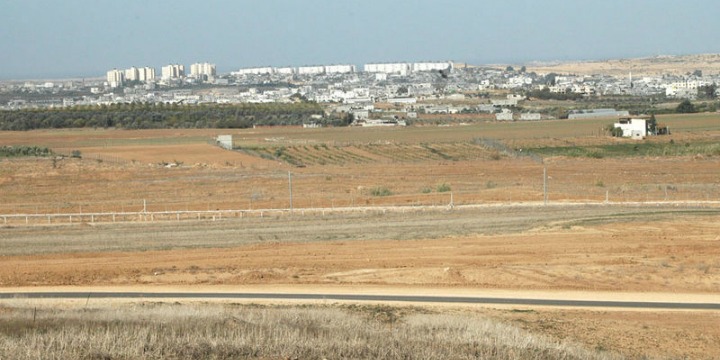Story on Gaza Student ‘Denied’ Education Visa Is Riddled With Distortions
 by Adam Levick
by Adam Levick
A September 27th article in the Independent by Bethan McKernan claims that a 28-year-old Palestinian student named Mohammed Awad was due to begin a masters program at the University of London — but may have to forfeit his place because of an “Israeli delay in approving his travel papers.”
Awad, who hails from Jabalia, north of Gaza City, is quoted as expressing his frustration at the “red tape and lengthy delays” at COGAT (Coordination of Government Activities in the Territories) — which is responsible for processing his application.
However, we contacted COGAT to inquire about the travel visa, and they responded by emphatically denying the Indy’s version of what occurred. A COGAT spokesperson told us that Awad’s application was approved for travel on November 14 — the exact date requested by the Palestinian Civil Affairs Committee. Though the article was updated (at some point after it was first published) to note a response by COGAT confirming that Awad’s application had been “submitted” for travel on November 14th, McKernan failed to make clear that it was, in fact, “approved.”
The headline accompanying McKernan’s article is even more misleading. It not only fails to reflect the reply from COGAT, but actually claims that Awad’s application was “denied” — despite the fact that the article doesn’t make this claim.

Additionally, the Indy piece asserts that Awad had previously “missed the chance to study in France in 2014 because of a delayed COGAT decision, as well as a professional development course in the West Bank last year.” But this too was denied by COGAT in an email to UK Media Watch. According to a COGAT spokesperson, this was his first such request.
Near the end of the article, McKernan includes a quote from an “expert” named Garry Spedding:
In a letter to MPs urging them to intervene in Mr Awad’s case, Gary Spedding, a cross-party consultant on Israel and the Palestinian Territories, said he could not “stress enough” “the value of bringing Palestinians from the Occupied Palestinian Territory, particularly that of the Gaza Strip, over to the United Kingdom for studies.”
McKernan obfuscates the fact that Garry Spedding is hardly an objective “consultant.” He’s a well-known pro-Palestinian activist, who founded a group called Palestine Solidarity Society at Queen’s University in Belfast. Spedding was deported from Israel in 2014 due to his reported involvement in organizing a protest at Queen’s, in which an Israeli official was attacked.
Further down in the article, the Indy contextualises COGAT’s putative delay of Awad’s travel request by alleging that “permission to leave Gaza is notoriously difficult to obtain for the enclave’s two million residents” — an Israeli process characterized by McKernan as “Kafkaesque.”
However, the statistics (provided to us by COGAT) tell a completely different story.
- In 2014, 65,539 crossings were coordinated from the Gaza Strip to Israel.
- In 2015, 103,784 crossings were coordinated from the Gaza Strip to Israel.
- In 2016, 99,864 crossings were coordinated from the Gaza Strip to Israel.
- In the first quarter of 2017, 39,219 crossings were coordinated from the Gaza Strip to Israel.

 Palestinian Prime Minister Announces New Reform Package
Palestinian Prime Minister Announces New Reform Package France: Man Suspected of Abducting, Raping Jewish Woman ‘to Avenge Palestine’
France: Man Suspected of Abducting, Raping Jewish Woman ‘to Avenge Palestine’ Israel Intensifies Strikes Across Gaza, Orders New Evacuations in North
Israel Intensifies Strikes Across Gaza, Orders New Evacuations in North Iran Threatens to Annihilate Israel Should It Launch a Major Attack
Iran Threatens to Annihilate Israel Should It Launch a Major Attack ‘Completely Baseless’: Reports of Mass Graves at Gaza Hospitals are False, IDF Says
‘Completely Baseless’: Reports of Mass Graves at Gaza Hospitals are False, IDF Says Columbia University Shutters Campus as Jews Fear for Safety, Critics Call for President to Resign
Columbia University Shutters Campus as Jews Fear for Safety, Critics Call for President to Resign ‘Hamas, We Love You!’ A List of the Chants, Statements From Columbia University’s ‘Gaza Solidarity Encampment’
‘Hamas, We Love You!’ A List of the Chants, Statements From Columbia University’s ‘Gaza Solidarity Encampment’ ‘Useless Pigs’: Anti-Israel Demonstrations Rage at Yale University, Forcing Police Intervention
‘Useless Pigs’: Anti-Israel Demonstrations Rage at Yale University, Forcing Police Intervention Anti-Israel Protesters Interrupt Chelsea Handler Comedy Show Because of Her Support for Jewish State
Anti-Israel Protesters Interrupt Chelsea Handler Comedy Show Because of Her Support for Jewish State Israeli Hostage Families Make Passover Plea for Return of Missing Loved Ones
Israeli Hostage Families Make Passover Plea for Return of Missing Loved Ones




 ‘Completely Baseless’: Reports of Mass Graves at Gaza Hospitals are False, IDF Says
‘Completely Baseless’: Reports of Mass Graves at Gaza Hospitals are False, IDF Says Iran Threatens to Annihilate Israel Should It Launch a Major Attack
Iran Threatens to Annihilate Israel Should It Launch a Major Attack Israel Intensifies Strikes Across Gaza, Orders New Evacuations in North
Israel Intensifies Strikes Across Gaza, Orders New Evacuations in North France: Man Suspected of Abducting, Raping Jewish Woman ‘to Avenge Palestine’
France: Man Suspected of Abducting, Raping Jewish Woman ‘to Avenge Palestine’ Palestinian Prime Minister Announces New Reform Package
Palestinian Prime Minister Announces New Reform Package